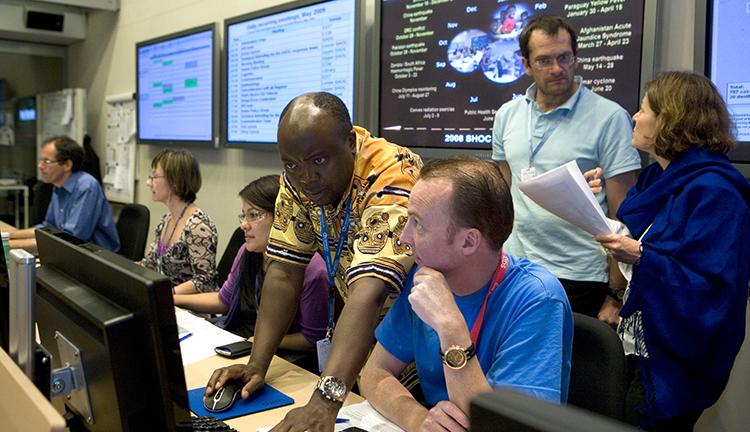
Pandemic simulation tests global emergency response
December 4, 2018
A simulation for a global pandemic response involving more than 40 countries will take place 4-6 December, 2018, coordinated by the World Health Organization’s Global Emergency Operations Centre (EOC) and by the EOC Network, a global network of health emergency operations centres. This is the first global pandemic response training exercise, and the third in a series of simulations this year, following regional exercises in Jordan and Senegal.
National and regional EOCs from around the world will take part in the interactive scenario, responding to emailed inputs from the WHO EOC. The scenario will revolve around an outbreak of influenza with pandemic potential on the fictional island nation of Mizzou, located off the coast of North America.
There is no actual virus: this is an internet training exercise. The training exercise takes place only within the offices of national and international EOCs. There is no deployment of people or goods. The exercise will not affect public or official activity.
The exercise is occurring on the centenary of the 1918 influenza pandemic (“Spanish flu”), which is estimated to have infected one third of the global population and resulted in the deaths of millions of people. The most recent global flu pandemic occurred about a decade ago. These events occur periodically and it is only a matter of a time before another global pandemic occurs. Member States have been working diligently with WHO to be prepared for the next event.
The exercise offers participants a way to test their plans and capabilities in a realistic environment to gain an in-depth experience that can best be achieved by practice. Evaluators drawn from Asia, North America, Europe, and Africa will be watching how the participating EOCs perform in real time, measuring performance against what is expected from existing procedures. This experience will identify gaps and areas for opportunity that will ultimately help in the assessment and improvement of Member States’ readiness to respond jointly and effectively to a global public health emergency. The exercise is only a part of the many ways WHO supports countries to be ready for global health emergencies.
“Investing in preparing for the big one now will save many lives in the future,” said Dr Matshidiso Moeti, WHO Regional Director for Africa. In this global outbreak game, the players are national health emergency response officials, using their own EOCs and equipment. “This kind of real world practice between national EOCs will serve us well in the event of a pandemic or other health emergency,” said Dr Mike Ryan, WHO Assistant DG for emergencies.
Australia’s National Action Plan for Health Security 2019-2023 (NAPHS) has been published and is available here.
Illustration about the Strategic Health Operations Centre (SHOC) at WHO HQ. WHO has established emergency operations centres in Geneva and in
regional offices. These centres play a vital role in supporting rapid, evidence-based decision-making and in facilitating coordination across organizations
and sectors. SHOC serves as the nerve centre of the networks of emergency operations centres and of WHO's global alert and response.
WHO archival photo/C.Black